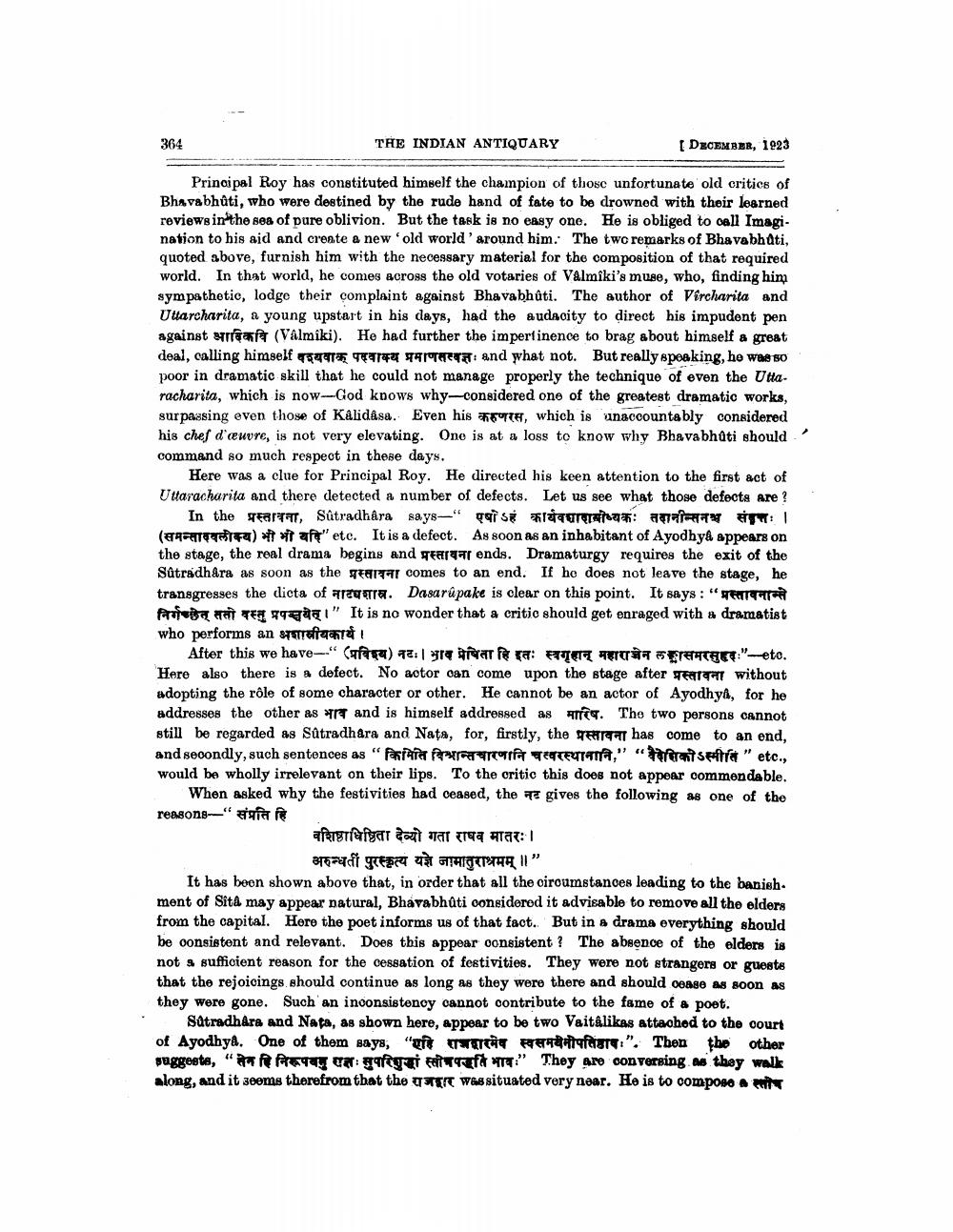________________
364
THE INDIAN ANTIQUARY
DECEMBER, 1923
Principal Roy has constituted himself the champion of those unfortunate old critics of Bhavabhûti, who were destined by the rude hand of fate to be drowned with their learned reviews in the sea of pure oblivion. But the task is no easy one. He is obliged to call Imagination to his aid and create a new old world' around him. The two remarks of Bhavabhati, quoted above, furnish him with the necessary material for the composition of that required world. In that world, he comes across the old votaries of Valmiki's muse, who, finding him sympathetio, lodge their complaint against Bhavabhùti. The author of Vircharita and Uttarcharita, a young upstart in his days, had the audacity to direct his impudent pen against erfit (Valmiki). He had further the impertinence to brag about himself a great deal, calling himself ET
TECTA: and what not. But really speaking, he was so poor in dramatic skill that he could not manage properly the technique of even the Utta. racharita, which is now-God knows why-considered one of the greatest dramatic works, surpassing even those of Kalidasa. Even his me, which is unaccountably considered his chef d'euvre, is not very elevating. One is at a loss to know why Bhavabhati should command so much respect in these days,
Here was a clue for Principal Roy. He directed his keen attention to the first act of Uttaracharita and there detected a number of defects. Let us see what those defects are ? In the year , Sutradhåra says-" To S aqorat: 1
: (FARETTIF) # aft" etc. It is a defect. As soon as an inhabitant of Ayodhyâ appears on the stage, the real drama begins and gear ar ends. Dramaturgy requires the exit of the Satradhara as soon as the farat comes to an end. If he does not leave the stage, he transgresses the dicta of area. Dasarupake is clear on this point. It says: " TAH par
TER 9ai" It is no wonder that a critic should get enraged with a dramatist who performs an saraftaad
After this we have-" Caf ) 72:1 rare : FTETE ETC ETETTE:"-eto. Here also there is a defect. No actor can come upon the stage after TETT without adopting the role of some character or other. He cannot be an actor of Ayodhyâ, for he addresses the other as art and is himself addressed as AFT. The two persons cannot still be regarded as Sutradhara and Nata, for, firstly, the TT has come to an end, and secondly, such sentences as "Perrara
P
rrora Tate ," "arratsaita" etc., would be wholly irrelevant on their lips. To the critic this does not appear commendable.
When asked why the festivities had ceased, the gives the following as one of the reasong-—" in
वशिष्ठाधिष्ठिता देव्यो गता राघव मातरः।
poradi gres EHITTYIHA 11" It has been shown above that, in order that all the ciroumstances leading to the banish ment of Sità may appear natural, Bhavabhậti considered it advisable to remove all the elders from the capital. Here the poet informs us of that fact. But in a drama everything should be consistent and relevant. Does this appear consistent? The absence of the elders is not a sufficient reason for the cessation of festivities. They were not strangers or guests that the rejoicings should continue as long as they were there and should eage as soon as they were gone. Such an inconsistency cannot contribute to the fame of a poet.
Satradhara and Nata, as shown here, appear to be two Vaitalikas attached to the court of Ayodhya. One of them says, "
f a fredag.". Then the other suggests, " f
a gfore traf TT" They are conversing as they walk along, and it seems therefrom that the user was situated very near. He is to compose a




